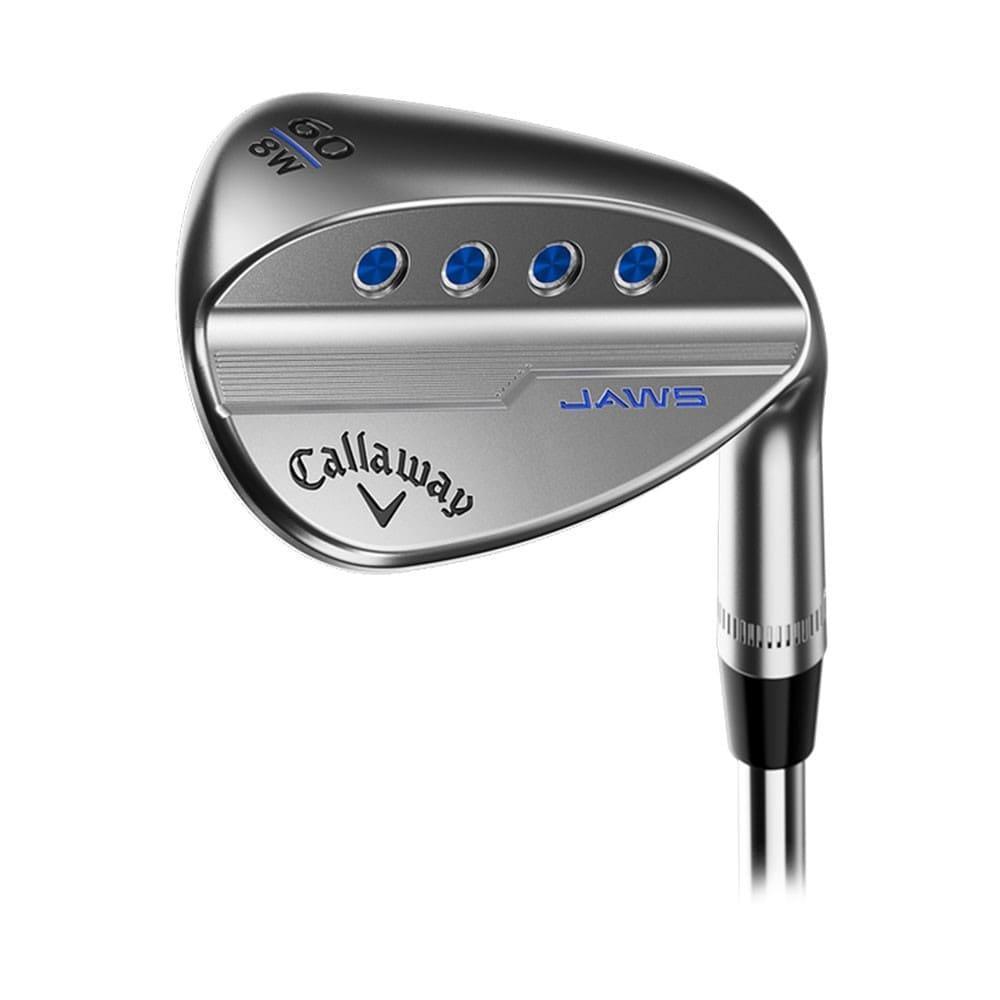
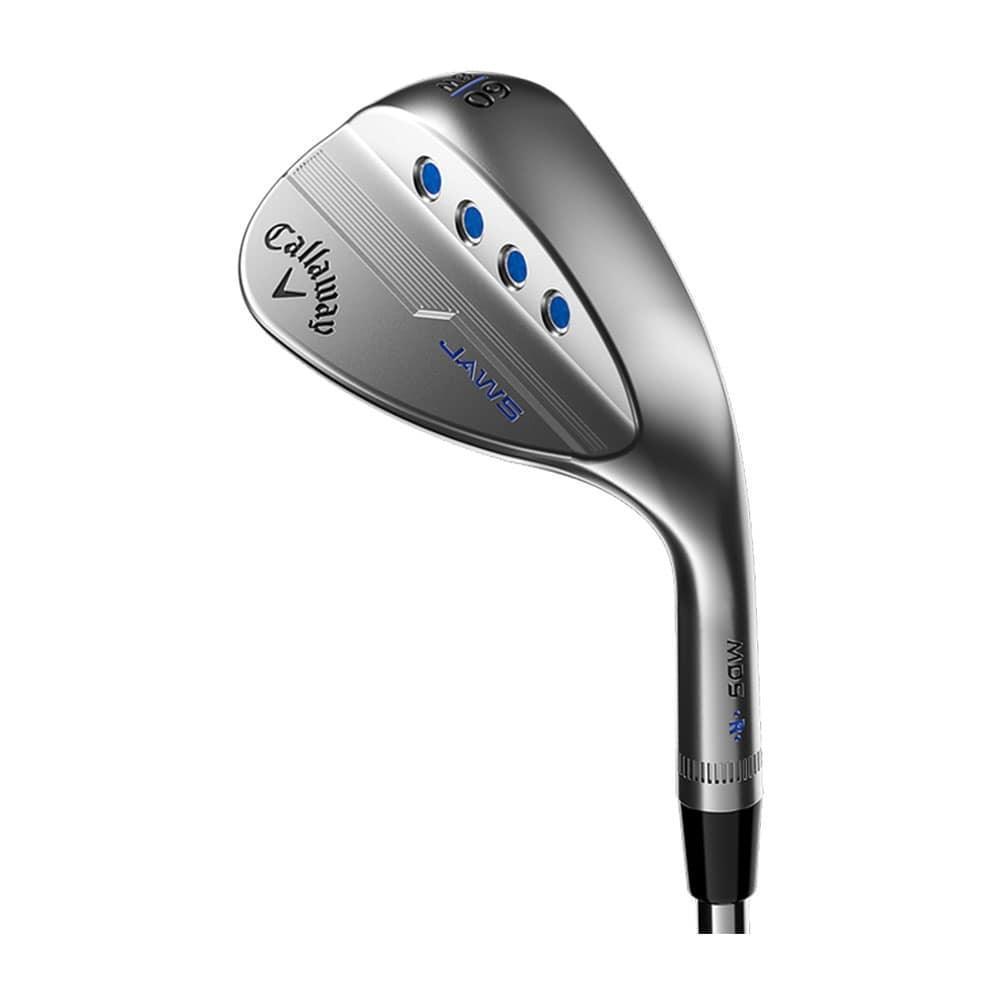
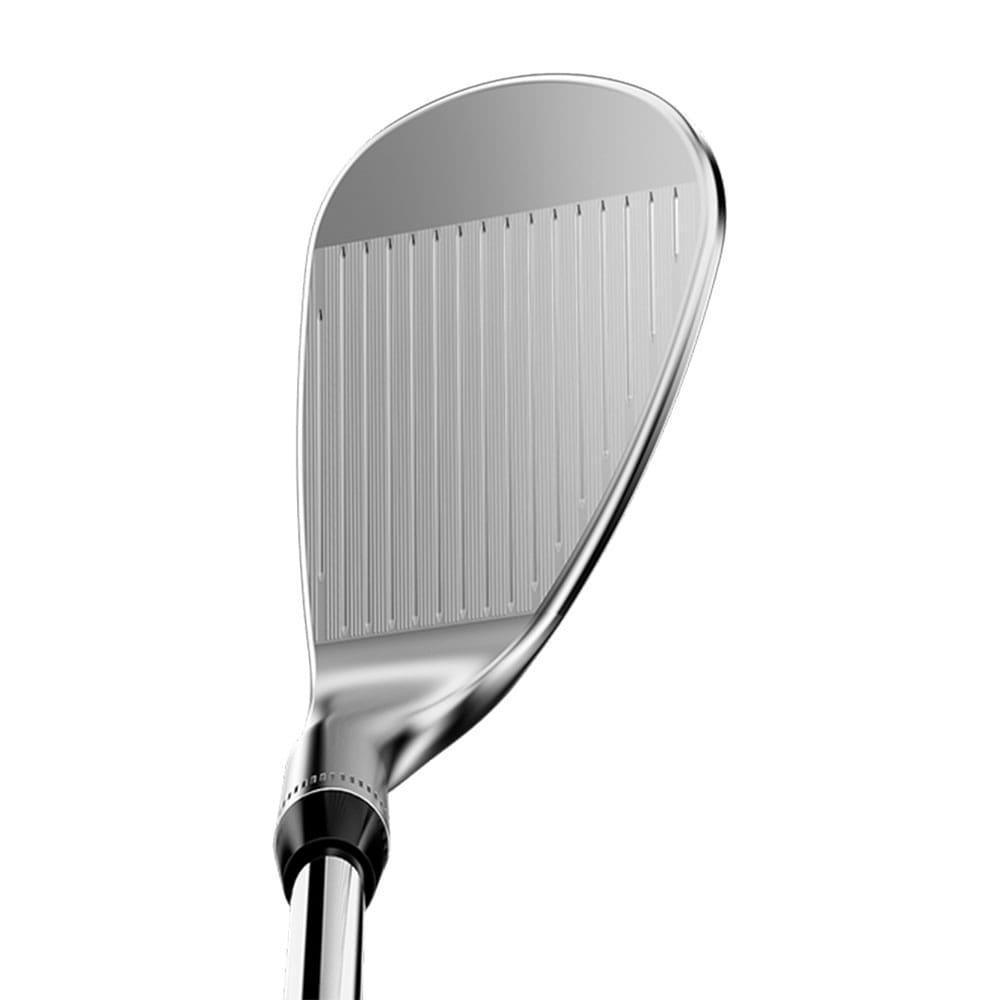
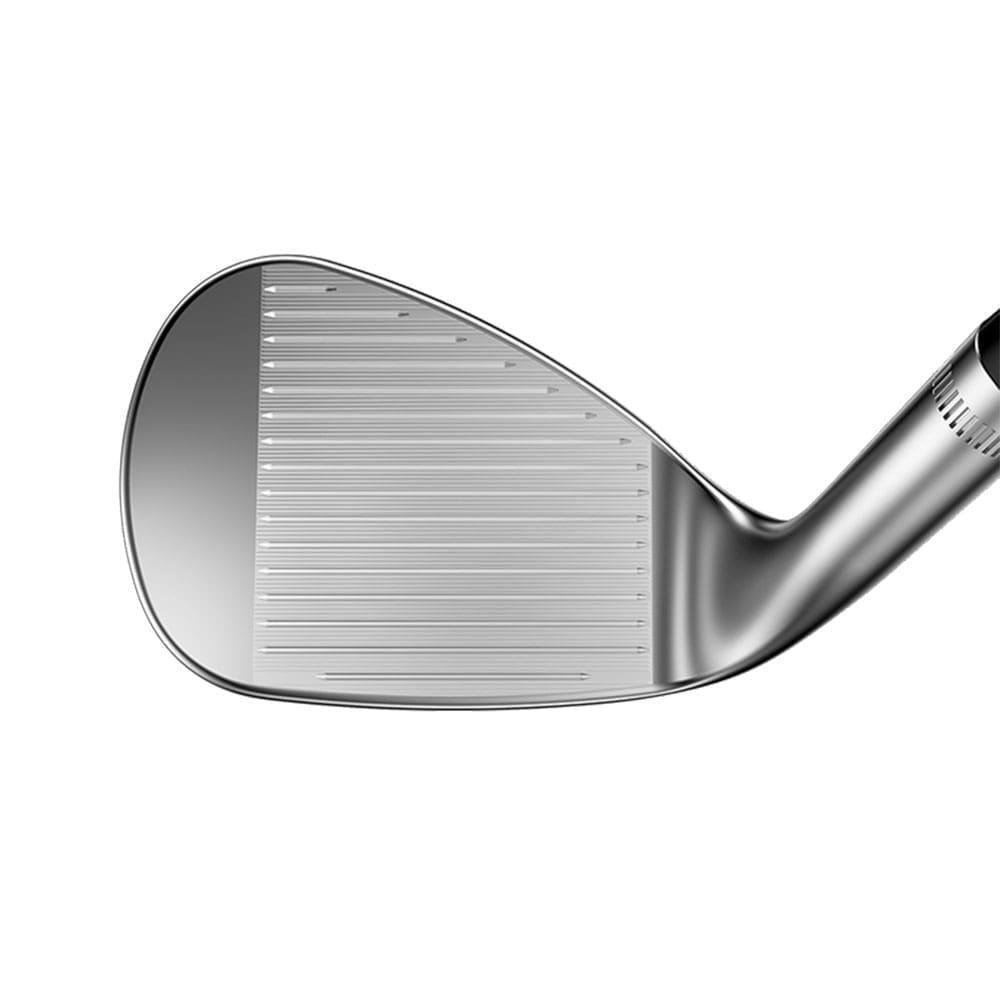
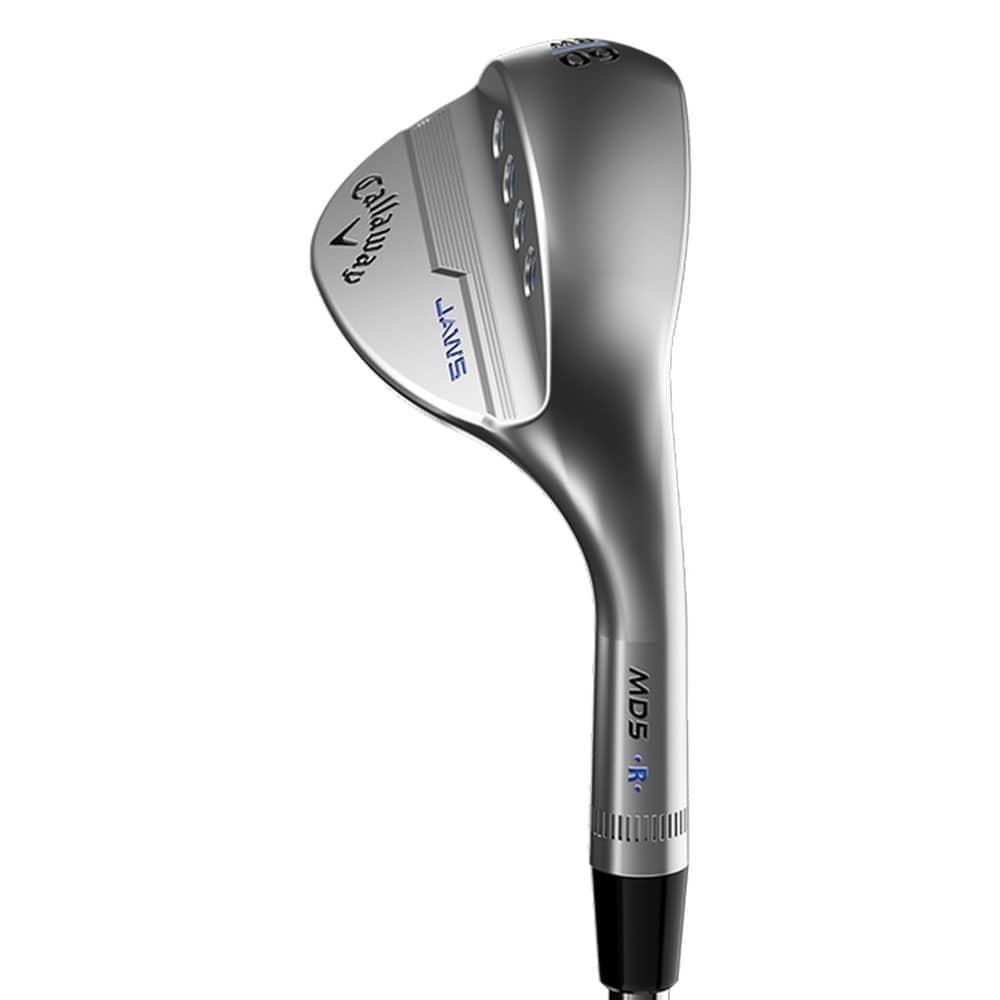
Callaway JAWS MD5 Platinum Chrome Steel Wedge
Tax included.
JAWS MD5 Wedges are crafted by Callaway Chief Designer Roger Cleveland with total performance: premium shapes, striking finishes, outstanding feel, unique versatility and exceptional spin.
Features & Details
New JAWS Groove Design with Groove-In-Groove Technology for Exceptional Spin
Innovative JAWS groove design with extremely sharp edge radius works with our proven Groove-in-Groove technology to impart more spin for precise control.
Precisely Shaped for A Beautiful Look and Extraordinary Feel from 8620 Mild Carbon Steel
Shaped by Roger Cleveland, these premium heads exude quality and superiority from every angle, while also delivering a soft and satisfying feel no other wedge can match. Two high-end finish options: Platinum Chrome and Tour Grey.
Callaway’s Most Comprehensive Wedge Line-up
JAWS MD5 wedges come in 23 different loft/bounce combinations with 5 distinct grind options: C-Grind and New Low Bounce W-Grind feature 8º of bounce. The S-Grind features 10º of bounce and X-Grind and W-Grind feature 12º of bounce. Also available in women’s specific models: 52º, 56º and 60º all in the W-Grind.
Optimized Head Progression
Head shaping progresses from traditional shaped lob and sand wedges to a compact player preferred design in the gap and pitching wedges for a seamless transition into an iron set.

GOLF WEDGE BUYING GUIDE: HOW TO CHOOSE THE BEST WEDGES IN 2025
Often called the "scoring clubs," wedges are your most important tools for shots inside 100 yards, chipping around the green, and escaping bunkers. At GolfEdgeIndia.com, we know that having the right combination of wedges can dramatically lower your scores. This expert guide will teach you everything about wedge loft, bounce, and grind, helping you choose the perfect setup for your short game in 2025.
💡 Pro Tip from GolfEdgeIndia: Our fitting data shows that players with properly gapped wedges and the correct bounce for their swing save an average of 3-5 strokes per round. The right wedges provide consistency and confidence when it matters most.
1. UNDERSTANDING THE FOUR TYPES OF GOLF WEDGES
A modern wedge set is typically comprised of four distinct types, each designed for a specific purpose. Understanding their roles is the first step to building a functional short-game toolkit.
| Wedge Type | Typical Loft Range | Primary Use | Typical Full Swing Distance* |
|---|---|---|---|
| Pitching Wedge (PW) | 43° - 48° | Full approach shots | 115 - 135 yards |
| Gap / Attack (GW/AW) | 48° - 54° | Full shots, long chips | 100 - 120 yards |
| Sand Wedge (SW) | 54° - 58° | Bunker shots, pitching | 80 - 100 yards |
| Lob Wedge (LW) | 58° - 64° | Flop shots, short pitches | 60 - 85 yards |
*Distance for average male golfers and varies based on loft and swing.
2. THE "BIG THREE" OF WEDGE FITTING: LOFT, BOUNCE & GRIND
Choosing the right wedges goes far beyond just the brand name. Three key technical aspects—Loft, Bounce, and Grind—determine how a wedge will perform for your unique swing and the course conditions you play on.
| 1. LOFT (Controls Distance) | 2. BOUNCE (Controls Turf Interaction) | 3. GRIND (Controls Versatility) |
|---|---|---|
| Loft is the primary factor determining how far and how high the ball flies. Proper "loft gapping" between your wedges (typically 4-6 degrees) ensures you have a club for every yardage inside your shortest iron. | Bounce is the angle of the sole from the leading edge to the back edge. More bounce prevents digging (good for soft turf/steep swings), while less bounce allows the club to sit closer to the ground (good for firm turf/sweeping swings). | The grind is the shaping and removal of material from the sole of the wedge around the heel and toe. Different grinds allow for more versatility, enabling you to open the clubface for different types of shots without the leading edge coming too high off the ground. |
Fitting Tip from GolfEdgeIndia.com: Your local course conditions are critical. Golfers in Kolkata playing on softer, post-monsoon turf will benefit from more bounce, while those playing on firm, dry fairways will need less. Test wedges in the conditions you play most often!
3. CHOOSING THE RIGHT BOUNCE ANGLE
Bounce is your best friend in a wedge, acting like the hull of a boat to prevent the club from digging into the turf or sand. Matching the bounce to your swing type (steep vs. shallow) and typical course conditions is the key to a consistent short game.
| Bounce Angle | Best For Swing Type | Best For Course Conditions |
|---|---|---|
| Low (4°-8°) | "Sweepers" who skim the grass with minimal divot. | Firm, dry turf; coarse sand; tight lies. |
| Mid (9°-12°) | Neutral angle of attack with moderate divots. | Most conditions; a versatile all-rounder. |
| High (13°+) | "Diggers" who take deep, heavy divots. | Soft, wet turf; fluffy, deep sand. |
4. UNDERSTANDING SOLE GRINDS
If bounce is about preventing digging, the grind is about adding creativity. By strategically shaping the sole, manufacturers can make a wedge that's both forgiving on full swings and versatile for delicate shots around the green.
Expert Tip from GolfEdgeIndia.com: Don't get overwhelmed by grind names (V, M, C, K, etc.). During a fitting session, focus on what you want the club to do. Do you need to hit high flop shots? A versatile grind with heel relief is what you should test.
5. WEDGE FINISHES & GROOVE TECHNOLOGY
Modern wedges feature advanced groove technology for maximum spin and come in various finishes to suit player preference for look and feel.
- Groove Technology: Brands use precise milling processes to create sharp, deep grooves that maximize spin. Many also feature micro-grooves or textures between the main grooves to increase friction and spin on partial shots.
- Tour Chrome/Satin Finish: A classic, durable finish that resists rust and reduces glare compared to a polished chrome. This is the most popular finish.
- Raw/Unplated Finish: These wedges are designed to rust over time. Many tour players prefer this as the rust can add texture to the face for slightly more spin and reduces glare significantly.
- Jet Black/Oil Can Finish: A dark, non-glare finish that looks great at address. Like a raw finish, this will wear and rust over time, which is a desirable trait for many players.
6. BUILDING YOUR WEDGE SET: PROPER GAPPING IS KEY
The goal of your wedge setup is to eliminate big distance gaps, giving you a specific club for every yardage inside 120 yards. This process, called "gapping," starts with knowing the loft of your pitching wedge.
Sample Wedge Setups
| Player Type | Setup Logic | Typical Lofts |
|---|---|---|
| The Minimalist (3 Wedges) | For players who prefer fewer clubs or have a strong pitching game with one trusted wedge. Gaps are slightly larger. | PW (46°), SW (52°), LW (58°) |
| The Standard Setup (4 Wedges) | The most common setup, providing consistent 4-6° loft gaps for precise yardage control. | PW (46°), GW (50°), SW (54°), LW (58°) |
| The Short Game Artist (5 Wedges) | For players who want a specific wedge for every possible shot, often replacing a long iron or hybrid to make room. | PW (46°), GW (50°), SW (54°), LW (58°), XW (62°) |
Gapping Tip from GolfEdgeIndia.com: The loft of your pitching wedge from your iron set is the starting point. Modern game-improvement PWs can be as strong as 43°. Knowing this number is essential to building a properly gapped wedge set.
7. FREQUENTLY ASKED QUESTIONS ABOUT GOLF WEDGES
ANSWER: Generally, your Pitching Wedge and sometimes your Gap Wedge will match your iron set. However, most golfers prefer "specialty" Sand and Lob wedges from brands that focus on wedge design (like Titleist Vokey, Callaway Jaws, or Cleveland). These offer more bounce and grind options for better short-game performance.
ANSWER: Because wedges are used from harsh lies like sand and for high-spin shots, their grooves wear down faster than irons. For avid golfers, we recommend replacing your most-used wedges (typically SW and LW) every 1-2 years to maintain maximum spin and control.
ANSWER: There is no difference! They are two different names for the same club. Its purpose is to fill the yardage "gap" between the pitching wedge and the sand wedge. Some brands call it an Approach Wedge (AW), others a Gap Wedge (GW), and some a Utility Wedge (UW).
Final Tip From GolfEdgeIndia Experts:
Your wedges are your scoring tools. Don't guess which loft, bounce, and grind combination is right for you. A professional fitting is the fastest way to build a wedge set that gives you confidence from any lie. Visit GolfEdgeIndia.com to find the perfect wedges to help you get up and down more often.

 Shop on WhatsApp
Shop on WhatsApp
 Shop on Video Call
Shop on Video Call